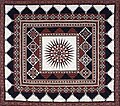Sashiko
This article needs additional citations for verification. (August 2016) |
Sashiko (刺し子, literally "little stabs") is a form of decorative reinforcement stitching (or functional embroidery) from Japan. Traditionally used to reinforce points of wear or to repair worn places or tears with patches, this running stitch technique is often used for purely decorative purposes in quilting and embroidery. The white cotton thread on the traditional indigo blue cloth gives sashiko its distinctive appearance, though decorative items sometimes use red thread.[1]
Sashiko embroidery was used to strengthen the homespun clothes of olden times. Worn out clothes were pieced together to make new garments by using simple running stitches. These clothes increased their strength with this durable embroidery.
Mostly geometric patterns are used to make this work. The common motifs used are waves, mountains, bamboo, bishamon, key fret, double cypress fence, arrow feathers, seven treasures, pampas grass, overlapping diamonds, linked diamonds, lightning, linked hexagons and persimmon flower. The embroidery uses special sashiko thread and needle. Modern day sashiko stitching is not restricted to the traditional indigo coloured fabric but uses a variety of colour combinations, and it is considered a beautiful surface embellishment for fabrics.
Many sashiko patterns were derived from Chinese designs, but just as many were developed by the Japanese themselves. The artist Katsushika Hokusai (1760–1849) published the book New Forms for Design in 1824, and these designs have inspired many sashiko patterns.
Patterns
- Tate-Jima (縦縞) — Vertical stripes
- Yoko-Jima (横縞) — Horizontal stripes
- Kōshi (格子) — Checks
- Nakamura Kōshi (中村格子) — Plaid of Nakamura family
- Hishi-moyō (菱模様) — Diamonds
- Yarai (矢来) — Bamboo Fence
- Hishi-Igeta (菱井桁) / Tasuki — Parallel diamonds / crossed cords
- Kagome (籠目) — Woven Bamboo
- Uroko (鱗) — Fish Scales
- Tate-Waku (竪沸く) — Rising steam
- Fundō (分銅) — Counterweights
- Shippō (七宝) — Seven Treasures of Buddha
- Amime (網目) — Fishing nets
- Toridasuki (鳥襷) — Interlaced circle of two birds
- Chidori (千鳥) — Plover
- Kasumi (霞) — Haze
- Asa no Ha (麻の葉) — Hemp leaf
- Mitsuba (三葉) — Trefoil
- Hirayama-Michi (平山道) — Passes in the mountains
- Kaki no Hana (柿の花) — Persimmon flower
- Kaminari (雷) — Thunderbolts
- Inazuma (稲光) — Flash of Lightning
- Sayagata (鞘型) — Key pattern
- Matsukawa-Bishi (松皮菱) — Pine Bark
- Yabane (矢羽) — Fletching
- and many more
References
- ^ Burke Harris, Erin (2013). QuiltEssential. Concord, CA: C&T Publishing. p. 102. ISBN 978-1-60705-793-2.






